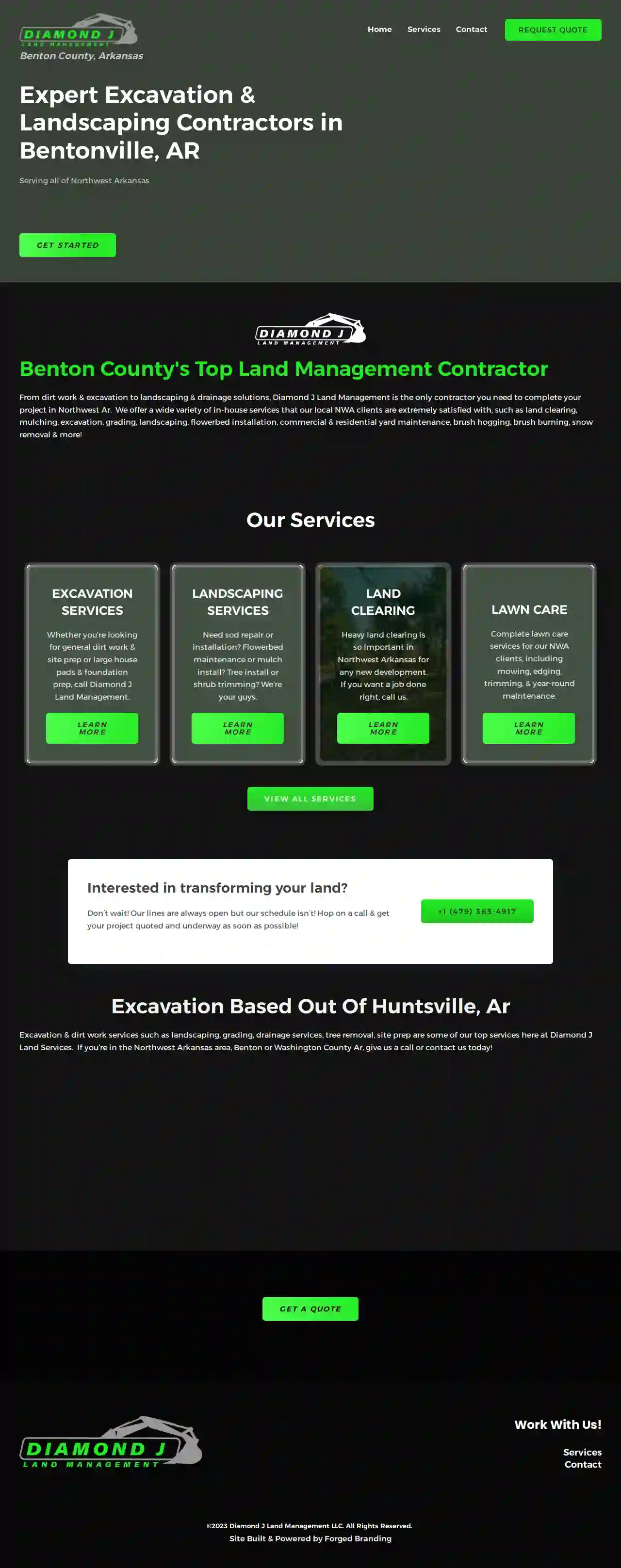Excavation Contractors Fort Smith
Find top Excavation Contractor in Fort Smith
Receive multiple Land Excavation quotes for your project today! Compare profiles, reviews, accreditations, portfolio, etc... and choose the best service.
- Ro
Ron Coleman Mining
4.5920 reviewsRogers, US- Services
- Why Us?
Get Quote - Ga
Gall Excavation, Inc.
3.633 reviewsRogers, US- Services
- Why Us?
Get Quote 
GNG Underground
57 reviewsRogers, USWelcome to GNG Underground Professional Excavation, Utility Trenching, and Landscaping Services for Northwest Arkansas Safety & Quality Service, Always our Priority Serving all of Northwest Arkansas Welcome to GNG Underground, providing experienced excavation and landscaping services for NWA GNG is a Veteran-Owned excavation company, based in Bella Vista and serving all of Northwest Arkansas GNG Underground is a multi-faceted excavating and landscaping company in Northwest Arkansas. From clearing land for your new project to installing storm shelters and septic tanks and propane tanks, GNG has you covered. We are your go-to outdoor utility company. We take pride in the quality of our work and the projects we complete for our clients. We offer a wide variety of outdoor excavation services in Northwest Arkansas so that when you need something done on your property, you know that you can call the trusted excavators at GNG Underground.
- Services
- Why Us?
- Gallery
Get Quote- Ti
Tidey Excavation, LLC
4.812 reviewsRogers, US- Services
- Why Us?
Get Quote - Gr
Grife Excavation
4.36 reviewsRogers, US- Services
- Why Us?
Get Quote 
Lukas Excavation and Demolishing
53 reviewsHot Springs, USAbout Us Licensed And Insured We are a State Licensed Excavation Contractor in Arkansas and Professionally Insured which puts us into the seat of responsibility and requires professionalism for every job we do. Prompt and Reliable We follow Arkansas State Laws and Industry Guidelines as a Licensed Excavation Contractor to complete your job promptly and reliably. We check with all Arkansas underground utility service providers before we dig to assure safety to ourselves and our customers. Satisfaction Guaranteed We strive to do every job as if we were the customer so there is complete satisfaction when the job is done. We provide excavation services in Montgomery County, Yell County, Hot Springs County, Pulaski County, Polk County, Saline County, Garland County, Pike County, Arkansas, Hot Springs, Hot Springs Village, Little Rock, North Little Rock, Malvern, Sims, Story, Mt. Ida, Mena, Russellville, Benton, Bryant, Bismarck, Maulmelle, Sherwood, Booneville, Danville, Searcy, Conway, Pine Bluff, Sheridan and many other cities within Arkansas.
- Services
- Why Us?
- Gallery
Get Quote- H&
H&D Concrete and Excavating
54 reviewsRogers, US- Services
- Why Us?
Get Quote - We
Weatherford Excavation
51 reviewsRogers, US- Services
- Why Us?
Get Quote 
Les Rogers Excavating & Materials
3.834 reviews1000 Wellington Rd, Stratford, N0B 2L0, USAbout Les Rogers Inc. Les Rogers Inc. is a family-owned and operated business with over 30 years of experience in the construction industry. We are committed to providing our clients with high-quality workmanship and exceptional customer service. Our team of skilled professionals is dedicated to delivering projects on time and within budget. We specialize in a wide range of construction services, including: Residential construction Commercial construction Renovations Additions Custom homes At Les Rogers Inc., we believe in building strong relationships with our clients. We take the time to understand your needs and goals, and we work closely with you throughout the entire construction process. We are committed to providing you with a positive and stress-free experience. Contact us today to learn more about our services and to schedule a free consultation.
- Services
- Why Us?
Get Quote
Diamond J Land Management
1Rogers, US- Services
- Why Us?
Get Quote
Over 21,512+ Excavation Contractors in our network
Our excavation pros operate in Fort Smith and surroundings!
ExcavationHQ has curated and vetted Top Excavation Businesses in Fort Smith. Find a top & reliable contractor today.
Frequently Asked Questions About Excavation Contractors
- Trench Collapses: Unstable trench walls can cave in, posing a severe risk to workers. Proper shoring and sloping are crucial safety measures.
- Utility Damage: Striking underground utilities (gas, water, electric) can cause leaks, explosions, or electrocution. Accurate utility locates and careful digging are essential.
- Falling Objects: Materials or equipment falling into excavations can injure workers. Securing work areas and using appropriate safety gear is vital.
- Equipment Accidents: Operating heavy machinery involves risks of rollovers, collisions, or mechanical failures. Trained operators and proper equipment maintenance are critical.
- Environmental Hazards: Excavated soil might contain hazardous materials (asbestos, lead). Proper testing and disposal procedures are necessary.
- Basement Size: The larger the basement, the more excavation is required, increasing the cost.
- Soil Type: Excavating rocky or dense clay soil is generally more expensive than loose soil.
- Accessibility: Difficult-to-access sites might require specialized equipment or more labor, driving up costs.
- Foundation Type: The chosen foundation type (full basement, crawl space, slab) affects excavation needs.
- Underpinning: If underpinning (strengthening existing foundations) is necessary, it significantly increases costs.
- Disposal Fees: Hauling excavated soil to disposal sites adds to the overall expense.
- Project Size and Scope: The larger and more complex the excavation, the higher the cost.
- Soil Type: Different soil types require different equipment and techniques, impacting costs. Rocky or clay-rich soil can be more expensive to excavate than loose soil.
- Accessibility: Difficult-to-access sites might require specialized equipment or additional labor, increasing expenses.
- Disposal Costs: Hauling away excavated material (soil, rocks, etc.) to disposal sites incurs additional fees.
- Permits and Inspections: Depending on local regulations, permits and inspections might be required, adding to the overall cost.
- Mechanical Excavation: Utilizing heavy equipment like excavators, backhoes, bulldozers, and loaders, suitable for most projects.
- Hand Excavation: Using hand tools (shovels, picks) for smaller excavations or delicate work near utilities.
- Blasting: Employing explosives to break up rock or hard materials, typically for large-scale projects.
- Hydro Excavation: Using high-pressure water jets to loosen and remove soil, often used for locating utilities or delicate excavation.
- Vacuum Excavation: Employing a vacuum system to suck up excavated material, suitable for safe excavation near utilities or in confined spaces.
What are the risks associated with excavation?
How much does it cost to excavate a basement?
How much does excavation cost?
What are the different methods of excavation?
What are the risks associated with excavation?
- Trench Collapses: Unstable trench walls can cave in, posing a severe risk to workers. Proper shoring and sloping are crucial safety measures.
- Utility Damage: Striking underground utilities (gas, water, electric) can cause leaks, explosions, or electrocution. Accurate utility locates and careful digging are essential.
- Falling Objects: Materials or equipment falling into excavations can injure workers. Securing work areas and using appropriate safety gear is vital.
- Equipment Accidents: Operating heavy machinery involves risks of rollovers, collisions, or mechanical failures. Trained operators and proper equipment maintenance are critical.
- Environmental Hazards: Excavated soil might contain hazardous materials (asbestos, lead). Proper testing and disposal procedures are necessary.
How much does it cost to excavate a basement?
- Basement Size: The larger the basement, the more excavation is required, increasing the cost.
- Soil Type: Excavating rocky or dense clay soil is generally more expensive than loose soil.
- Accessibility: Difficult-to-access sites might require specialized equipment or more labor, driving up costs.
- Foundation Type: The chosen foundation type (full basement, crawl space, slab) affects excavation needs.
- Underpinning: If underpinning (strengthening existing foundations) is necessary, it significantly increases costs.
- Disposal Fees: Hauling excavated soil to disposal sites adds to the overall expense.
How much does excavation cost?
- Project Size and Scope: The larger and more complex the excavation, the higher the cost.
- Soil Type: Different soil types require different equipment and techniques, impacting costs. Rocky or clay-rich soil can be more expensive to excavate than loose soil.
- Accessibility: Difficult-to-access sites might require specialized equipment or additional labor, increasing expenses.
- Disposal Costs: Hauling away excavated material (soil, rocks, etc.) to disposal sites incurs additional fees.
- Permits and Inspections: Depending on local regulations, permits and inspections might be required, adding to the overall cost.
What are the different methods of excavation?
- Mechanical Excavation: Utilizing heavy equipment like excavators, backhoes, bulldozers, and loaders, suitable for most projects.
- Hand Excavation: Using hand tools (shovels, picks) for smaller excavations or delicate work near utilities.
- Blasting: Employing explosives to break up rock or hard materials, typically for large-scale projects.
- Hydro Excavation: Using high-pressure water jets to loosen and remove soil, often used for locating utilities or delicate excavation.
- Vacuum Excavation: Employing a vacuum system to suck up excavated material, suitable for safe excavation near utilities or in confined spaces.